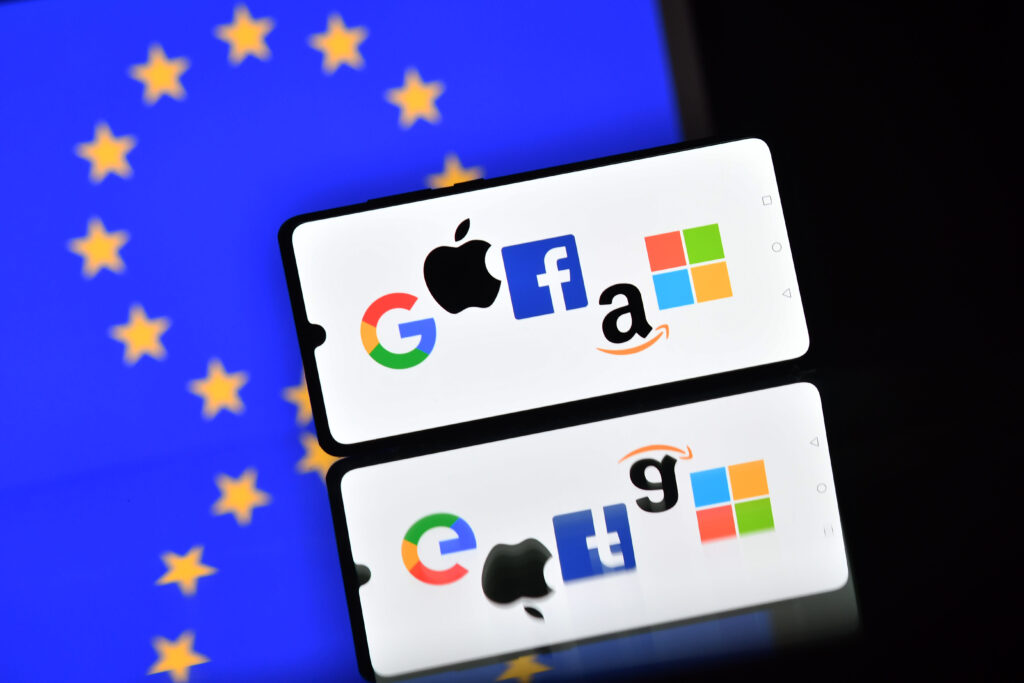The phone displays the logos of Google, Apple, Facebook, Amazon, and Microsoft, with the EU flag in the background.
Justin Tallis | AFP (via Getty Images)
The Digital Markets Act aims to crack down on anti-competitive behavior by tech companies and force them to open up some of their services to other competitors. Small Internet companies and other companies complain that they are being harmed by these companies' practices.
Bill Echikson, non-resident senior follower at the Center for European Policy Analysis (CEPA), said EU reform meant tech giants graduated from “teenagers” to “adults”.
“There are a lot of changes that may or may not happen. A lot of it is uncertain,” Echikson said. But he added that the new law could prompt changes in other countries, such as the U.S. and the U.K., and ultimately force tech companies to coordinate their platforms globally.
CNBC breaks down how this law will affect not only big tech companies in the US, but also consumers in the EU.
The EU Digital Markets Law primarily affects US tech giants such as Alphabet, Amazon, Apple and Meta.
The reason is that this regulation applies to so-called “gatekeepers”, i.e. platforms with a strong position in their respective markets, a market capitalization of at least 75 billion euros ($81.7 billion) and 45 million monthly active end users. This is because it imposes strict restrictions on companies that hold In the EU.
That makes US tech giants a prime target. So far, six companies have been designated as gatekeepers: Alphabet, Amazon, Apple, Meta, Microsoft, and China's ByteDance, the only non-US company on the list.
These companies will need to adjust their platforms to create healthier competition within the bloc.
For example, you need to make sure your platform doesn't prioritize your services over your competitors'. For example, Google cannot force a user to choose its own search engine when setting up her Android phone, and must display alternative search engines such as DuckDuckGo or Ecosia.
Some messaging apps, such as Facebook Messenger, require their services to be “interoperable” with third-party messaging services so that users can send messages using alternative products.
On the other hand, companies with strong positions in app distribution must also allow competing apps to appear on their platforms.
Apple was ordered under the DMA to allow alternative app stores on the iPhone for the first time.
The tech giant was fined more than 1.8 billion euros ($1.96 billion) by the European Union this week for breaching competition rules following an investigation into its App Store practices.
The EU believes Apple broke the law by preventing app developers from informing iOS users about alternative, cheaper music subscription services available outside of their apps. Spotify praised the commission's decision, but Apple denied that the App Store violated the law.
The fine could be a sign of things to come as DMA enforcement officially begins. Companies that continue to violate the law can be fined as much as 10% of their worldwide annual revenue.
The rules have already sparked major changes in how big tech companies serve customers in the EU.
Further adjustments are likely as competitors of the big tech companies are not satisfied with the proposals submitted so far.
Apple recently announced that it is opening up its iPhones and iPads to alternative app stores. Developers have long complained that Apple charges them a 30% commission on in-app purchases.
Still, app developers such as Microsoft, Spotify and video game developer Epic Games remain frustrated because Apple's implementation adds hurdles beyond providing installation files that can be downloaded on their websites.
Meta also said that Facebook Messenger and WhatsApp can now work with third-party messaging services as long as they follow Signal's end-to-end encryption protocols to ensure privacy.
Google, on the other hand, has added a selection screen where users can choose which search engine they want to set as the default on their Android smartphone. This has already been introduced, with the likes of Microsoft, Ecosia and DuckDuckGo appearing on the list of multiple search engine providers.
Google recently added more selection screens. Rivals argue that this unnecessarily complicates things by requiring users to click more than necessary to set their primary search provider.
“You're going to see a lot of pop-up screens because you're going to be able to select other search engine browsers somehow,” CEPA's Echikson said.
Google also changes the actual search engine. The company has removed flight tickets from search results for EU consumers, and searches for hotels now also include a carousel of ads from price comparison sites.
Some experts are concerned that this may actually mean that large online booking sites like Booking.com will benefit from this change, and that smaller local hotels will instead benefit. ing.
“We are treading new ground, and there may be a lot of uncertainty,” Echikson said. “It might not only strengthen some of the gatekeepers, but it might also give little David more room against Goliath.”


